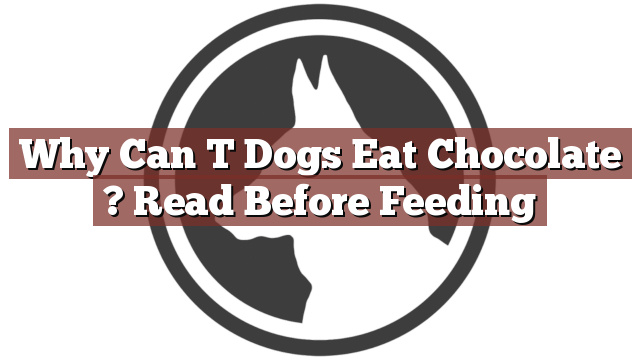Understanding Your Dog’s Dietary Needs
As responsible pet owners, it is crucial for us to understand our dog’s dietary needs. Dogs have different nutritional requirements compared to humans, and it is our responsibility to ensure they receive a balanced and healthy diet. While dogs can eat a variety of foods, there are certain human foods that can be harmful or even toxic to them. One such food is chocolate.
Why Can’t Dogs Eat Chocolate? Read Before Feeding
Can dogs eat chocolate? The answer is a resounding no. Chocolate contains theobromine and caffeine, which are both toxic to dogs. These substances belong to a group of chemicals called methylxanthines, which affect the central nervous system and cardiovascular system of dogs. While humans can metabolize theobromine and caffeine efficiently, dogs eliminate these substances much more slowly, leading to a toxic buildup in their system.
The severity of the symptoms depends on the amount and type of chocolate ingested, as well as the size and overall health of the dog. Symptoms of chocolate toxicity in dogs may include vomiting, diarrhea, increased heart rate, tremors, seizures, and in severe cases, it can even be fatal. Therefore, it is crucial to keep all chocolate products out of your dog’s reach and never intentionally feed them chocolate.
Pros and Cons of Feeding Chocolate to Dogs
There are no pros when it comes to feeding chocolate to dogs. The cons, on the other hand, can have serious consequences for your furry friend’s health. As mentioned earlier, chocolate contains theobromine and caffeine, which can cause a range of symptoms from mild gastrointestinal upset to life-threatening conditions. It is important to note that the toxicity of chocolate varies depending on its type. Dark chocolate and baking chocolate have higher concentrations of theobromine and caffeine compared to milk chocolate, making them even more dangerous for dogs.
If you suspect that your dog has ingested chocolate, it is crucial to seek immediate veterinary assistance. Your veterinarian may induce vomiting, administer activated charcoal to absorb the toxins, provide supportive care, and monitor your dog closely for any complications. Remember, prevention is always better than cure, so keep chocolate products securely stored and educate your family and friends about the dangers of feeding chocolate to dogs.
In Conclusion: Protecting Your Dog’s Health by Avoiding Chocolate
In conclusion, it is vital to understand that chocolate is toxic to dogs and should never be fed to them. Theobromine and caffeine present in chocolate can have detrimental effects on their health, ranging from gastrointestinal issues to potentially fatal conditions. As responsible pet owners, it is our duty to safeguard our dogs’ well-being by keeping chocolate out of their reach and ensuring that our family and friends are aware of the dangers associated with feeding chocolate to dogs. By providing a balanced and appropriate diet for our furry companions, we can ensure they lead happy, healthy lives free from the risks posed by certain human foods.
Thank you for taking the time to read through our exploration of [page_title]. As every dog lover knows, our furry friends have unique dietary needs and responses, often varying from one canine to another. This is why it's paramount to approach any changes in their diet with caution and knowledge.
Before introducing any new treats or making alterations to your dog's diet based on our insights, it's crucial to consult with a veterinarian about [page_title]. Their expertise ensures that the choices you make are well-suited to your particular pet's health and well-being.
Even seemingly harmless foods can sometimes lead to allergic reactions or digestive issues, which is why monitoring your dog after introducing any new food item is essential.
The content provided here on [page_title] is crafted with care, thorough research, and a genuine love for dogs. Nevertheless, it serves as a general guideline and should not be considered a substitute for professional veterinary advice.
Always prioritize the expert insights of your veterinarian, and remember that the health and happiness of your furry companion come first.
May your journey with your pet continue to be filled with joy, love, and safe culinary adventures. Happy reading, and even happier snacking for your canine friend!

